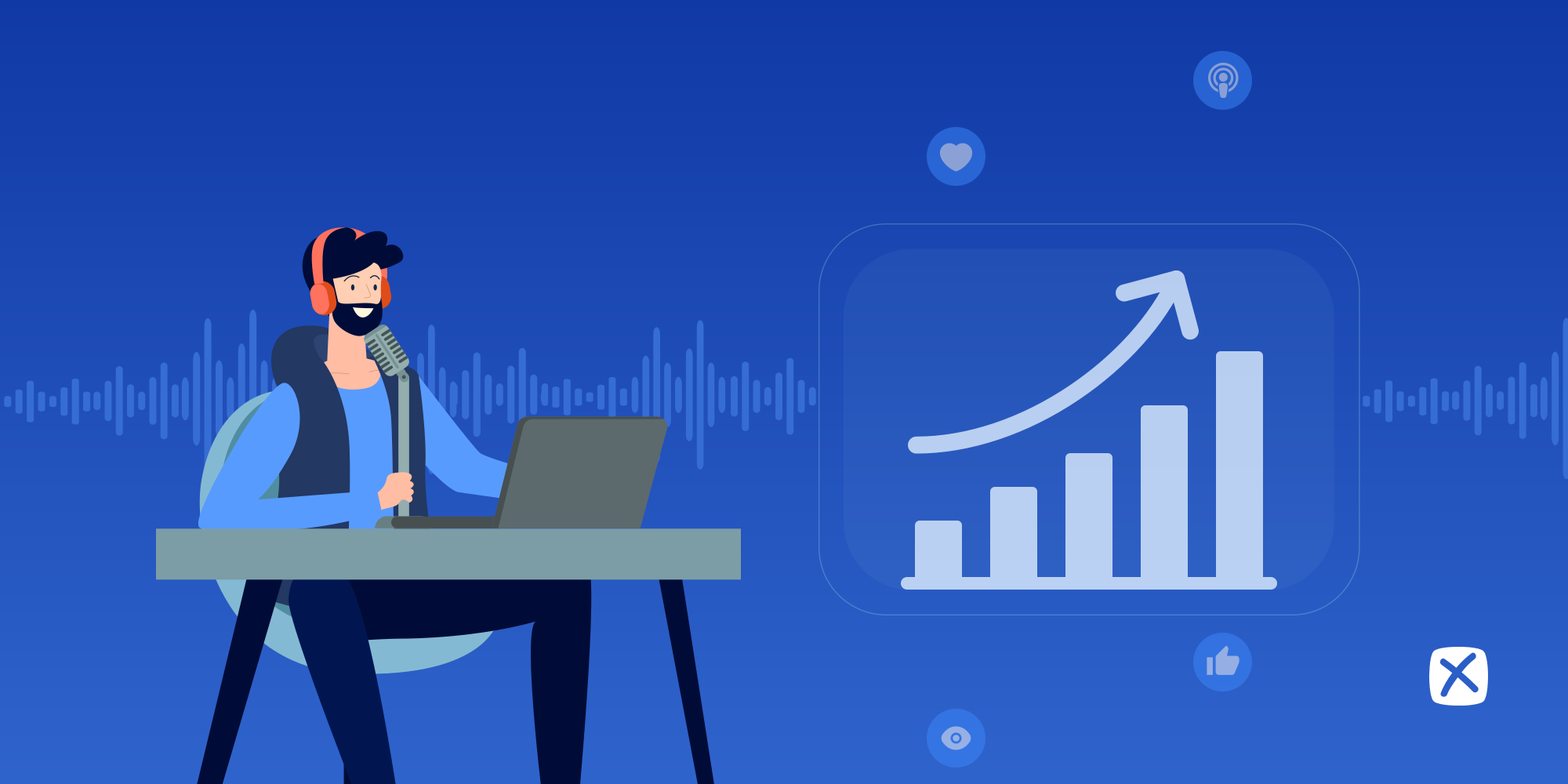PodcastingAudience BuildingContent CreationPodcast PromotionHow to Start a Podcast with No Audience: A Comprehensive GuideSenthil
Senthil
8 min read
Senthil

Are you ready to dive into the exciting world of podcasting, even if you're starting with no existing audience? This comprehensive guide will walk you through every step of the process, from identifying your niche to effectively promoting and monetizing your podcast.
Discovering Your Niche and Target Audience
The Significance of Your Niche
Before embarking on your podcasting journey, it's crucial to define your niche. Your niche represents the specific topic or theme that your podcast will revolve around. It plays a pivotal role in attracting a dedicated audience genuinely interested in your content.
Identifying Your Niche
- Passion Exploration: Start by brainstorming topics that genuinely ignite your passion. Your enthusiasm will naturally shine through in your content.
- Audience Insights: Dive deep into understanding your potential audience. Uncover their preferences, challenges, and needs.
- Competition Analysis: Take time to study other podcasts within your chosen niche. Learn about their content style, the subjects they cover, and their engagement strategies. Use this knowledge to differentiate your podcast and offer unique value.
Essential Podcasting Equipment
Equipment Checklist
To ensure top-notch audio quality for your podcast, consider investing in the following essential equipment:
- Microphone: Opt for a high-quality microphone, such as the Blue Yeti USB microphone or the Audio-Technica ATR2100x-USB.
- Headphones: Choose closed-back headphones to minimize audio bleed during recording.
- Pop Filter: Enhance overall audio clarity by using a pop filter to reduce unwanted sounds.
- Boom Arm and Shock Mount: These accessories help position your microphone effectively and reduce vibrations.
- Recording Software: Utilize user-friendly software such as Audacity (free) or GarageBand (for Mac users) for recording.
- Editing Tools: Software options like Adobe Audition or Hindenburg Journalist PRO offer robust editing capabilities.
Recording Your Inaugural Episode
Follow these steps to record your first episode with confidence:
- Setup: Find a quiet recording environment with minimal background noise. Employ soft furnishings and blankets to dampen sound reflections.
- Practice: Conduct test recordings to fine-tune microphone settings and get comfortable speaking into the microphone.
- Recording Tips: Speak clearly, maintain a consistent pace, and infuse your personality into your content. Keep background noise to a minimum and maintain a consistent microphone distance.
Consistent Content Creation
Crafting a Content Calendar
Creating a content calendar is pivotal for staying organized and ensuring regular episode releases. Plan your episodes in advance, concentrating on subjects that resonate with your target audience. Establish a practical schedule for recording and releasing episodes.
| Week | Episode Topic | Recording Date | Release Date |
|---|---|---|---|
| 1 | [Topic 1] | [Date] | [Date] |
| 2 | [Topic 2] | [Date] | [Date] |
| ... | ... | ... | ... |
Striking a Balance Between Quality and Consistency
While consistency is essential, never sacrifice content quality for the sake of frequency. Prioritize creating engaging and valuable episodes that cater to your audience's interests.
Learning from Podcasting Success Stories
Case Studies
Examine the journeys of renowned podcasters like Joe Rogan, Pat Flynn, or Sarah Koenig from the "Serial" podcast. Gain insights into their content creation strategies, audience engagement techniques, and monetization approaches. Adapt their successful methods to your podcasting journey.
Time to Achieve Success
It's important to recognize that most successful podcasters took several months or even years to build a substantial audience. Patience and dedication are key ingredients for long-term podcasting success.
Effective Podcast Promotion
Marketing Strategies
Implement these marketing strategies to effectively promote your podcast:
- Social Media: Utilize platforms such as Instagram, Twitter, and Facebook to engage with potential listeners. Share episode announcements, behind-the-scenes content, and actively interact with your audience.
- Collaborations: Partner with other podcasters or influencers in your niche. Guest appearances on other podcasts or joint episodes can introduce your show to new audiences.
- Engaging Content: Create promotional materials such as audiograms, teaser trailers, or visually appealing graphics that are shareable and attention-grabbing. Consider investing in paid ads on social media platforms to expand your reach.
Fostering Audience Engagement
Engagement Strategies
Engaging with your audience is pivotal for podcast growth. Implement these techniques:
- Encourage Listener Feedback: Prompt your audience to provide feedback through social media, email, or voice messages. Address their questions, comments, and suggestions in your episodes.
- Host Q&A Sessions: Dedicate episodes or segments to answering listener questions. This fosters a sense of connection and community.
- Include Listener Contributions: Provide opportunities for your audience to share their stories, opinions, or advice on your podcast. This boosts engagement and creates a sense of community ownership.
Monetizing Your Podcast
Timing Your Monetization
Consider exploring monetization options once you've established a stable listener base. Initially, focus on building your audience and delivering valuable content.
Diverse Revenue Streams
Multiple revenue streams can help monetize your podcast:
- Sponsorships: Partner with brands relevant to your audience. Reach out to potential sponsors or join podcast advertising networks.
- Advertisements: Integrate ad segments into your episodes to generate revenue. Explore podcast ad marketplaces or consider direct advertising with relevant businesses.
- Merchandise: Create branded merchandise such as t-shirts, mugs, and more, and offer them to your listeners through an online store or platforms like Patreon.
Inspirational Insights from Podcasting Pros
Gary Vaynerchuk
From starting with his dad's wine store to building a media empire, Gary Vaynerchuk's journey is a testament to success. His podcast, The GaryVee Audio Experience, offers insights into hustling, personal branding, and navigating the digital world.
Hala Taha
Hala began her podcast, Young and Profiting, with no prior experience and limited resources. Today, she's a financial expert and entrepreneur empowering young adults. Her story embodies resilience, calculated risks, and the power of self-belief.
Lewis Howes
The School of Greatness podcast started with Lewis interviewing friends in his living room. Today, he's interviewed some of the world's most successful individuals, inspiring millions to achieve their goals. His message? Start small, believe in the power of small wins, and never give up on your dreams.
Marie Forleo
Marie's podcast, Marie Forleo B-School Podcast, serves as a valuable resource for entrepreneurs and creators. Her journey is marked by persistence and continuous learning. Her advice? Be patient, keep creating valuable content, and don't hesitate to experiment.
Michael Bungay Stanier
The Coaching for Leaders podcast has become a go-to resource for leadership development. Michael's story revolves around identifying a need and building a community around it. His takeaway? Focus on serving your audience and providing them with the tools and resources they need to succeed.
Remember, the most successful podcasters started from scratch. Embrace the challenge, commit to creating valuable and consistent content, engage with your audience, and remain patient. With time and dedication, you can build a successful podcast from the ground up.
Additional Resources
For further guidance on your podcasting journey, explore these resources:
Podcasting Equipment Guides:
Podcast Editing Software Tutorials:
- Reaper: Tutorials: Reaper Tutorial for Beginners by Kenny Gioia
Podcasting Resources:
Frequently Asked Questions for New Podcasters
Q: How often should I release new episodes?
A: The release frequency depends on your schedule, but consistency is essential. Weekly or bi-weekly episodes are common.
Q: How can I improve my podcast's audio quality?
A: Invest in a high-quality microphone, record in a quiet environment, and learn basic audio editing techniques.
Q: What is the ideal length for a podcast episode?
A: The ideal length varies based on your content and audience, but most successful podcasts range from 20 minutes to an hour. Ensure your content is engaging and concise to maintain listener interest.
Q: Do I need a script for my podcast episodes?
A: Having a script or an outline can help you stay organized and cover all necessary points. Some podcasters prefer a spontaneous and conversational approach. Find the style that works best for you, but always maintain a clear structure for your episodes.
Q: How do I handle technical issues during a live podcast recording?
A: Technical problems can occur, so it's crucial to stay calm and communicate with your audience. You can edit out issues during post-production. To minimize technical challenges, regularly test your equipment and software before live recordings.
Q: Should I include music in my podcast, and how can I obtain the rights to use it?
A: Music can enhance your podcast, but be cautious about copyright issues. Use royalty-free music, tracks with proper licensing, or create your music to avoid copyright problems. Several music libraries and services offer podcast-friendly tracks for a fee.
Q: How should I handle negative feedback or criticism from listeners?
A: Negative feedback is a part of podcasting. Approach criticism constructively, listen to listener concerns, and consider improvements when necessary. Engage with your audience respectfully to turn negative feedback into growth opportunities.
Q: What's the best way to monetize my podcast?
A: Monetizing your podcast takes time and a growing audience. Start by exploring sponsorships, advertisements, or affiliate marketing. You can also offer premium content or merchandise to loyal listeners. Prioritize building a substantial audience before focusing on monetization.
Q: Is it beneficial to join podcasting communities or networks?
A: Joining podcasting communities or networks can be highly beneficial. It provides opportunities for collaboration, cross-promotion, and access to valuable resources and knowledge sharing. Being part of a supportive community can accelerate your podcast's growth.
Q: How can I track my podcast's performance and audience engagement?
A: You can track your podcast's performance using podcast hosting platforms and analytics tools like Apple Podcasts Connect, Google Podcasts Manager, or dedicated podcast analytics services. Monitor download numbers, listener demographics, and listener feedback to gauge audience engagement and make informed decisions.
Q: How do I ensure my podcast remains relevant and continues to grow over time?
A: To keep your podcast relevant and growing, stay updated on industry trends, consistently create high-quality content, engage with your audience through social media and listener feedback, and adapt your content to match your audience's interests. Learning from successful podcasters and continually improving your podcast will contribute to long-term growth.
Remember, every successful podcaster started with zero listeners. With dedication and perseverance, your podcast can evolve into a thriving platform for sharing your passions and stories.

